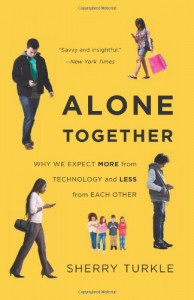5.0 out of 5 stars No robot could have written this February 16, 2011
Diana Senechal
That was one of my thoughts as I read Sherry Turkle's Alone Together: no matter what robots learn to do, they will never learn to write a book as thoughtful, informative, and intense as Alone Together. They would not know how to pose the questions, let alone use such discernment in addressing them.
It is interesting that Turkle chose to discuss robots in the first part of the book and the Internet in the second part. By presenting the “strange” part first, she gives us a sense of how strange our everyday lives actually are, how far we have moved away from enjoying each other's presence.
Turkle quotes children and adults who hesitate to use the phone because it seems awkward and intrusive; it is much easier, they say, to dash off a text or email. At the same time, Turkle points out, because of this very convenience, people expect quick responses. She describes the anxiety of teenagers when they do not get an immediate reply to their text messages. One girl talks about needing her cell phone for “emergencies”; it turns out that what she means by “emergency” is having a feeling without being able to share it.
Turkle shows how our Internet communications mix the deliberate with the unconsidered. On the one hand, people put great effort even into short email messages. On the other, they “test” ideas and expressions in formation to see how others react. Some create fake online profiles just to try out different sides of their personality. The problem with such experimentation is that it is conditioned almost entirely by online reactions, often reactions of strangers. There is little room to form thoughts independently.
Throughout the book, Turkle brings up the question of solitude. What happens to our solitude when we are able to get responses to anything and are expected to provide responses in turn? What happens to our sense of dissent when everything we say and do online bears a trace? She points out how important privacy is to dissent, for if we have no place where we can think and act unseen, we end up policing ourselves and censoring our own thoughts. We tame and restrain ourselves, knowing that anything we do and say may end up “out there” forever. “But sometimes a citizenry should not simply ‘be good,'” Turkle writes. “You have to leave space for dissent, real dissent.”
Also, Turkle points out, when we have no privacy we lose the ability to privilege some thoughts and actions over others. She quotes Eric Schmidt, CEO of Google, who says that “if you have something you don't want anyone to know, maybe you shouldn't be doing it in the first place.” Like many others, he ignores the possibility that there might be privacy without shame or crime. We might want to keep things to ourselves for any number of reasons; when we “put everything out there,” that “everything” is somehow trivialized. Turkle quotes a girl who claims there's nothing much to know about her; “I'm kind of boring.” Will the loss of privacy lead more people to dismiss themselves as boring?
One of Turkle's most powerful points is that we have come “to take the performance of emotion as emotion enough.” Who cares, some might say, if the robot cannot feel? It behaves as though it feels, and that's enough. But is it? I see similar assumptions in education, where test scores are equated with learning, and students' visible activity in class is equated with “engagement.” How do you go about defending something that is not tangible, visible, or measurable? It is difficult, but Turkle does it.
Because this book is so informative, because Turkle understands the complexities of technologies, she can make bold statements. She insists that we have the capacity and obligation to question the principles behind new inventions. She suggests that the touch of a human hand is indeed different from a robot's, that a handwritten letter is different from a text, that thinking and remembering have value even when it seems there's no more time for them. I won't give away the ending, but it left me with a surprising sadness, as though in a movie theater, when it's over and the place is dark, and you sit there for a few minutes, stunned, before getting up and walking out into the blink-provoking street.




